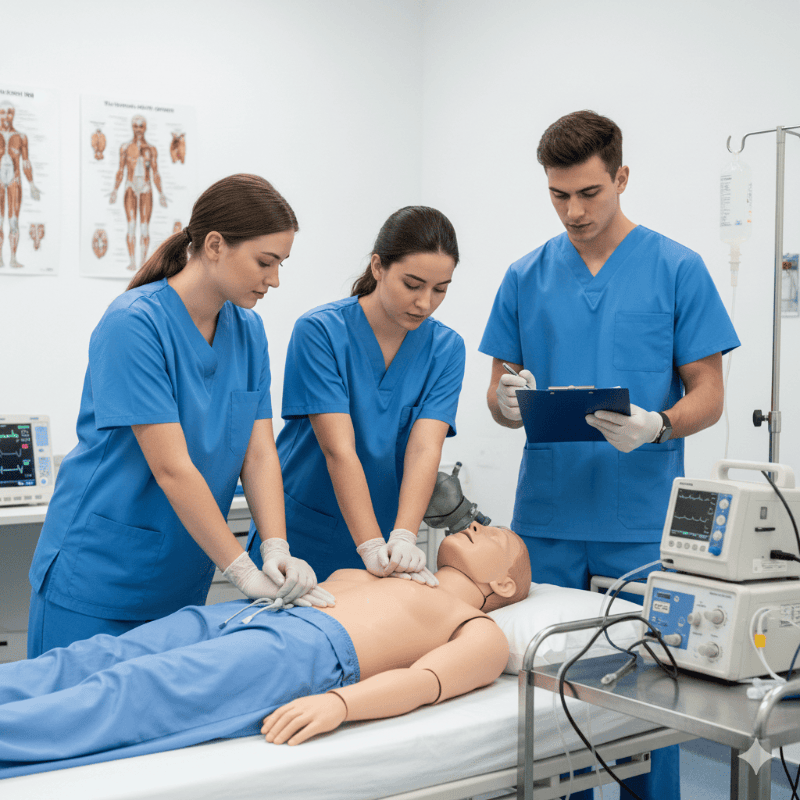ERIS project launches to standardise European simulation training
The European Union has initiated funding for the European Research Institute on Simulation (ERIS), a coordinated effort to address the fragmentation of simulation-based medical education across member states. The two-year project, running from 1 May 2025 to 30 April 2027, aims to establish the first pan-European framework for simulation training in interventional cardiac electrophysiology.

The EU Horizon Programme-funded initiative responds to a documented deficiency in standardised, academically driven simulation training for healthcare professionals throughout Europe. Currently, most simulation courses are organised by private companies, creating a disjointed educational landscape where theoretical instruction, simulation practice, and laboratory access remain separated. Whilst these commercial offerings maintain quality standards, their structure often results in redundancy and limited accessibility depending on geographical location.
Addressing cardiovascular disease burden through structured training
The initiative addresses a pressing clinical need. Cardiovascular diseases account for nearly 45% of all deaths in Europe, according to the European Society of Cardiology. Project coordinator Professor Serge Boveda, co-head of the Cardiac Arrhythmia Management Department at the Clinique Pasteur Toulouse in France, notes the increasing healthcare demands from an ageing population. “This market is highly dynamic, with innovations and new technologies continually emerging to enhance patient care and safety – including those involving simulation in order to facilitate and optimise training in novel sophisticated procedures,” he states.
Interventional electrophysiology (EP) represents one of the most rapidly evolving cardiology subspecialties. EP disorders, encompassing conditions such as atrial fibrillation, ventricular arrhythmias, supraventricular tachycardias, and heart block, demonstrate increasing prevalence globally. The growing complexity of therapeutic interventions for these conditions necessitates comprehensive practical training that integrates theoretical knowledge with hands-on simulation and laboratory experience.
Establishing a collaborative academic network
The ERIS project will function as an independent, hybrid educational and research infrastructure. The collaborative framework brings together medical device companies, academic institutions, healthcare providers, patient associations, hospitals, and scientific societies. Over its 24-month duration, the consortium will develop educational pathways and academic programmes utilising advanced simulators from partner companies.
The Fundació de Gestió Sanitària Hospital de la Santa Creu i Sant Pau in Barcelona coordinates the project. Partner institutions include the Clinique Pasteur Toulouse, Vrije Universiteit Brussels, the European Society of Cardiology (ESC), the European Heart Rhythm Association (EHRA), and VALDE SL, which handles project administration.
Comprehensive objectives and scalable framework
Professor Boveda outlines the project’s multifaceted approach. “Among the various aims of the ERIS are to expand and facilitate the access to simulation-based medical education by organising high quality specific training modules on novel procedures, optimising existing simulators and eventually developing new ones, initially in EP, then extending to other cardiology specialties and clinical scenarios,” he explains. The initiative will develop and accredit an EU-level academic programme in interventional cardiac electrophysiology combining theoretical and practical components in contemporary therapies.
The ERIS framework emphasises flexibility and scalability to accommodate rapidly evolving procedures and technologies. The project will establish agile processes for developing new teaching modules and foster innovation through structured dialogue amongst patients, professionals, and industry to identify gaps and improve clinical outcomes.
Strategic role of professional societies
The ESC, represented through its EHRA subspecialty branch, leads the communication, dissemination, and exploitation work package. This role encompasses increasing project visibility amongst policymakers, healthcare professionals, hospitals, universities, medical technology and simulation companies, scientific societies, and civil society. The ESC and EHRA will integrate ERIS training modules within EHRA’s existing educational pathway, creating synergies and harmonisation across European electrophysiology education.
Professor Boveda emphasises the collaborative research component. “They will also participate in collaborative research initiatives focused on advancing simulation technologies and improving performance assessment methods,” he notes. The organisations will contribute to designing an innovative simulator-based educational curriculum aligning with European accreditation standards.
Implications for clinical practice standardisation
The ERIS project addresses systemic challenges in European medical education. Current training heterogeneity limits professional mobility, restricts networking opportunities, and creates inconsistencies in patient care across member states. By establishing standardised, academically validated training modules, ERIS aims to ensure healthcare professionals throughout Europe maintain proficiency in current best practices and innovative procedures.
The infrastructure’s design prioritises adaptability to incorporate scientifically validated procedures and emerging technologies. This approach supports continuous professional development in a field characterised by rapid technological innovation and evolving clinical protocols. The initiative represents a coordinated effort to optimise training quality and, consequently, patient outcomes across the European healthcare system.
- For more information, visit: www.ERIS-EU.eu

